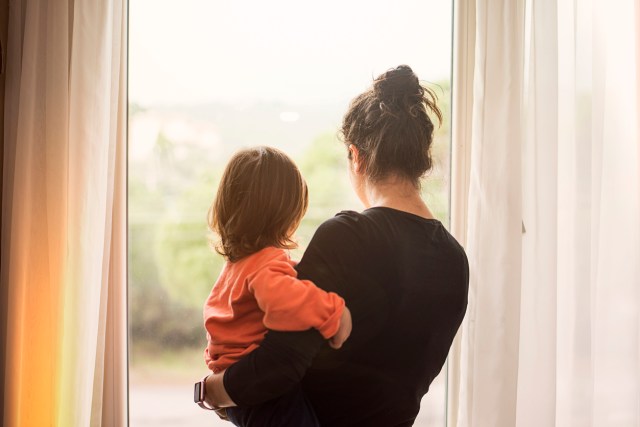With COVID-19 being front and center in everyone’s minds, the world is a very different place than it was a few weeks ago. While kids are not on the front lines dealing with the situation, they definitely feel the anxiety, whether it’s from the change in routine or from us adults (it’s inevitable). Your kiddos may be asking questions about why they need to stay home and if they’ll get sick, so we’ve rounded up answers from a panel of experts to help you answer those questions. Here are 10 ways to communicate with your kids about COVID-19.
1. Give your kiddo clear and age-appropriate information. Even adults are easily overwhelmed by coronavirus news and information. According to Colleen Colaner, associate professor of communication at the University of Missouri, kids are aware that there is a big, scary thing happening. Giving them details can help them understand what's happening. But make sure to use clear and accurate terminology. Kids can be very literal with words, so euphemisms can actually cause confusion.
2. Focus on the positives. Use this time as an opportunity to enjoy family time together and be present. When your kiddos are upset they can't see friends or go to the park, acknowledge those feelings, and then do an activity together as a family. Steve Gross, a licensed social worker and head of Life is Good Playmakers, suggests using this time to create, play, read, sing, dance and be in nature together.
3. Thank the helpers and heroes. Kids typically think of police and fire fighters as community heroes. This is a great time to teach them about the people who are working to keep the community safe, including nurses, doctors, ambulance drivers, grocery store clerks and the many others who are still working. For an activity, get out paper and crayons and make cards together to give to those individuals.
4. Keep life as scheduled as you can. Consistency is so helpful for kids. Psychotherapist Noel McDermott suggests creating a daily structure for kids, including a weekly timetable of education and activities. The structure will help calm and reassure your kiddos and also teaches them that the time at home is not automatically for electronics.
5. "It's okay to be scared and upset." This is a time of unprecedented uncertainty. Fear and anxiety are very real and normal emotions for kids and adults. The Centers for Disease Control and Prevention suggests parents validate those emotions in their kids, and explain that they feel the same. Encourage them to share their feelings, and also reassure little ones that they will make it through together.
6. Keep news coverage to a minimum. Matthew Biel, a child psychiatrist at Georgetown University School of Medicine, states that parents should think about how to communicate coronavirus information to kids and part of that means not constantly watching the news or going online for updates. With kids, in particular, the constant information can scare kids repeatedly and deepen already existing feelings of anxiety.
7. Answer questions honestly, but practice your responses. Kids are natural question-askers. Coronavirus is likely to spark questions such as "Is everyone getting sick?," "Why can't I go to school or see my friends?" and "Will grandma be okay?" Dr. Kyle Pruett, child psychiatrist and member of The Goddard School’s Educational Advisory Board, suggests parents rehearse with a partner or friend what you feel ready to answer. This will help you appear less fearful and anxious when it comes time to talk with your kids.
8. Be a role model. Helping your kids feel less anxious about coronavirus means you need to model that behavior and practice self care. Take breaks, get plenty of sleep, exercise and eat well. Use FaceTime, Zoom or Skype to connect with friends and family.
9. Use a "feeling thermometer" to measure emotions. Aureen Wagner, a clinical child psychologist at the Anxiety Wellness Center, tells parents to use the thermometer to check their kiddo's emotional state. Use a scale of 1 to 10, where 10 refers to peak anxiety. The “thinking” brain works best when the “feeling” brain is under 5. Wagner says if kids are at an 8, 9 or 10, that is not the time to talk to them about sensitive issues. Similarly, if YOU are at an 8, 9, or 10, hold off from a discussion as well.
10. Get outside. Physical activity helps minimize feelings of fear and anxiety. Make time each day for physical activities. This can be a family walk, backyard soccer or even an impromptu dance party.
—Leah R. Singer
RELATED STORIES:
11 Simple Ways to Help a Kid Deal with Anxiety
